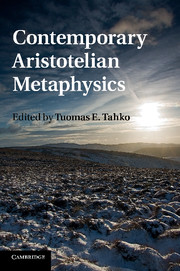Book contents
- Frontmatter
- Contents
- Contributors
- Preface
- Introduction
- Chapter 1 What is metaphysics?
- Chapter 2 In defence of Aristotelian metaphysics
- Chapter 3 Existence and quantification reconsidered
- Chapter 4 Identity, quantification, and number
- Chapter 5 Ontological categories
- Chapter 6 Are any kinds ontologically fundamental?
- Chapter 7 Are four categories two too many?
- Chapter 8 Four categories – and more
- Chapter 9 Neo-Aristotelianism and substance
- Chapter 10 Developmental potential
- Chapter 11 The origin of life and the definition of life
- Chapter 12 Essence, necessity, and explanation
- Chapter 13 No potency without actuality: the case of graph theory
- Chapter 14 A neo-Aristotelian substance ontology: neither relational nor constituent
- References
- Index
Chapter 9 - Neo-Aristotelianism and substance
Published online by Cambridge University Press: 05 December 2011
- Frontmatter
- Contents
- Contributors
- Preface
- Introduction
- Chapter 1 What is metaphysics?
- Chapter 2 In defence of Aristotelian metaphysics
- Chapter 3 Existence and quantification reconsidered
- Chapter 4 Identity, quantification, and number
- Chapter 5 Ontological categories
- Chapter 6 Are any kinds ontologically fundamental?
- Chapter 7 Are four categories two too many?
- Chapter 8 Four categories – and more
- Chapter 9 Neo-Aristotelianism and substance
- Chapter 10 Developmental potential
- Chapter 11 The origin of life and the definition of life
- Chapter 12 Essence, necessity, and explanation
- Chapter 13 No potency without actuality: the case of graph theory
- Chapter 14 A neo-Aristotelian substance ontology: neither relational nor constituent
- References
- Index
Summary
In this chapter, I characterize Aristotle’s groundbreaking work on ontological categories, and his two analyses of what it is to be an individual substance. Based on this characterization, I then list a set of three conditions that a theory of substance must meet to qualify as a neo-Aristotelian theory of substance. Several other conditions that characterize Aristotle’s theory of substance are also listed, but I judge these to be inessential to a neo-Aristotelian theory of substance. I then turn to an examination of three contemporary or near-contemporary neo-Aristotelian theories of substance, with the aim of showing that they all satisfy the three essential conditions of being neo-Aristotelian theories, and I am able to show that all three also share at least some of the other features of Aristotle’s theory of substance.
Aristotle on substance and ontological categories
Neo-Aristotelianism in metaphysics is an extension of and/or in imitation of Aristotle’s metaphysics. A neo-Aristotelian theory of substance, then, is one that is an extension of and/or is in imitation of Aristotle’s views about substance. I begin, therefore, with a brief account of what Aristotle had to say about substance.
- Type
- Chapter
- Information
- Contemporary Aristotelian Metaphysics , pp. 140 - 155Publisher: Cambridge University PressPrint publication year: 2011

